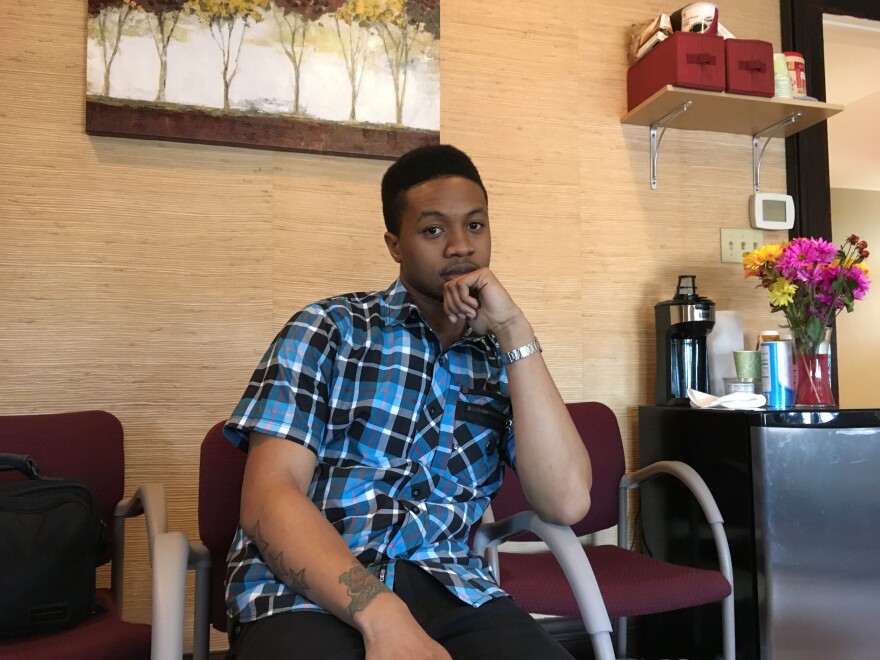At a recovery support group in Bridgeport, Connecticut, Lance Supersad and Paul Elliott are seated across from each other. Supersad, 20, leans forward, listening intently as Elliott tells him about his history of addiction -- how it started in reaction to a breakup and cost Elliott his job as a security guard.
Supersad nods. It’s a familiar story to him.
“So if you don’t mind me asking, what drugs were you on?” Supersad asks. Elliott tells him: cocaine and prescription pills.
“Same here,” says Supersad. Elliott’s been clean for eight months; Supersad’s been clean for just under two years.
“It sounds crazy 'cause you’re older than me, but I’m proud of you,” Supersad says. “One time I actually came to somebody and talked about recovery, and they laughed at me, you know what I mean?”
No one’s laughing at Supersad now. He’s one of Connecticut’s young recovery coaches: he goes to support groups, speaks at high schools and spends time on the phone with other people recovering from addiction.
But two years ago, you would have seen a different Supersad. In 2014 he was addicted to cocaine, ecstasy and Percocet. He was arrested when he robbed a bank to support his addiction. The arrest report went viral because of his unusual name: Lancelot Supersad, Jr. Jimmy Kimmel mocked him on national television. It was the kind of “funny mugshot” story that turns up from time to time as a quick news blip.
Supersad laughs about it now.
“When I heard Jimmy Kimmel laughing about it and making fun of me, I laughed myself,” he says. “It’s funny. I have a funny last name. Joke about my name. Do not joke about what I went through.”
His addiction cost him the future he’d been planning -- he was studying to be a surgical technician at Bridgeport Hospital’s School of Nursing. But his recovery may give him a new future. He wants to make a full-time career out of recovery. He believes he can help others out of the same darkness he escaped.
“I want to take the covers off of people’s heads and show them that this is real,” he says. “People are dying. People are dying from opiate overdoses. More than people dying from homicides.”
More than 700 people died from overdoses in Connecticut in 2015. That number’s only been going up. It’s more than twice the number of people who died from overdoses in 2012.
The Connecticut Community for Addiction Recovery (CCAR) runs Lance’s recovery group, along with centers for people recovering from addiction in Bridgeport, Hartford and Willimantic. CCAR Director Deb Dettor says more and more young people are coming into their centers struggling with heroin or opiate addictions.
“We talk a lot about being a face and voice of recovery,” she says. “Which is about using our own stories to teach about recovery. To demonstrate that recovery is real and that there’s hope in the communities.”
CCAR is one of several groups in Connecticut who’ve had a place at a series of anti-addiction roundtables from New London to Waterbury over the past few months. Several have been hosted by U.S. Senator Richard Blumenthal, the co-sponsor of a bill to step up efforts to fight heroin and opiate addiction.
That bill includes recovery programs, measures to prevent people from getting addicted and law enforcement programs that target heroin and opiate trafficking. It passed the Senate last week, but not before it was stripped of more than $600 million in funding.
“It hurts a little bit,” Supersad says.
He’s glad Congress is finally paying attention. But he says that money could really have come in handy for Connecticut.
“We need more treatment for addicts out there,” he says. “We need more treatment for people in recovery.”
Supersad wants to do what he can to provide that treatment. That’s why he wants to make recovery a full-time career.
He hopes someday the name Lance Supersad will make the news again. The next time, it won’t be as a joke, but as the name of someone who overcame a potentially deadly addiction.


